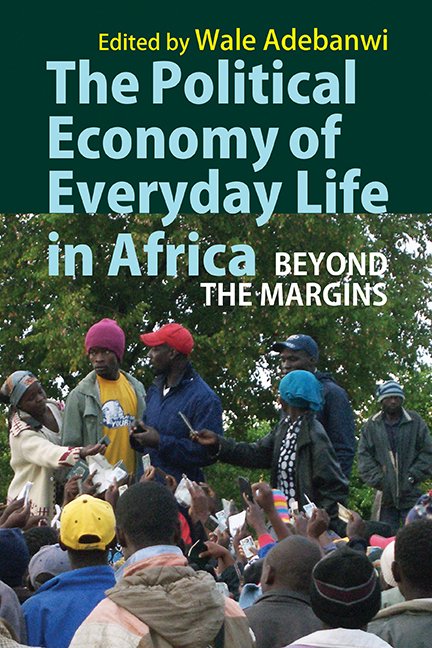Book contents
- Frontmatter
- Dedication
- Contents
- Maps, Illustrations & Tables
- Notes on Contributors
- Foreword
- Acknowledgements
- Approaching the Political Economy of Everyday Life An Introduction
- Part I MONEY MATTERS: CURRENCY & FISCAL LIFE STRUGGLES
- Part II LABOUR, SOCIAL LIVES & PRECARITY
- Part III MARGINALITY, DISAFFECTION & BIO-ECONOMIC DISTRESS
- Part IV HISTORICITY, TEMPORALITY, AGENCY & DEMOCRATIC LIFE
- 11 History as Value Added? Valuing the Past in Africa
- 12 Cultural Mediation, Colonialism & Politics Colonial ‘Truchement’, Postcolonial Translator
- 13 ‘Kos'ona Miran?’ Patronage, Prebendalism & Democratic Life in Contemporary Nigeria
- Afterword: The Landscapes Beyond the Margins Agency, Optimization & the Power of the Empirical
- Index
13 - ‘Kos'ona Miran?’ Patronage, Prebendalism & Democratic Life in Contemporary Nigeria
from Part IV - HISTORICITY, TEMPORALITY, AGENCY & DEMOCRATIC LIFE
Published online by Cambridge University Press: 31 August 2018
- Frontmatter
- Dedication
- Contents
- Maps, Illustrations & Tables
- Notes on Contributors
- Foreword
- Acknowledgements
- Approaching the Political Economy of Everyday Life An Introduction
- Part I MONEY MATTERS: CURRENCY & FISCAL LIFE STRUGGLES
- Part II LABOUR, SOCIAL LIVES & PRECARITY
- Part III MARGINALITY, DISAFFECTION & BIO-ECONOMIC DISTRESS
- Part IV HISTORICITY, TEMPORALITY, AGENCY & DEMOCRATIC LIFE
- 11 History as Value Added? Valuing the Past in Africa
- 12 Cultural Mediation, Colonialism & Politics Colonial ‘Truchement’, Postcolonial Translator
- 13 ‘Kos'ona Miran?’ Patronage, Prebendalism & Democratic Life in Contemporary Nigeria
- Afterword: The Landscapes Beyond the Margins Agency, Optimization & the Power of the Empirical
- Index
Summary
Introduction
In this chapter, I offer a view on the prospects for democracy in Nigeria against a backdrop of Jane Guyer's timeless concern with the dynamics of autonomy, resilience, co-optation and capitulation of micro (marginal, local) processes, structures and actors in their daily interactions and negotiations with the macro (dominant, national). In this regard, I attempt an outline of elements of continuity, change and the suspended – if restive and tense – state between change and continuity, in the role of patronage in the evolving democratic possibilities in Nigeria's Fourth Republic. I do all this in the specific context of Jane Guyer's enduring focus on and contributions to African studies in general and the study of Nigeria in particular. No less important, this chapter also engages with Guyer's intellectual encounters and collaborations with African scholars against the backdrop of her steadfast commitment to, and interest in, life in Nigeria, which has yielded unusual insights evident in her work on the African continent – a continent described by some as characterized by wholesale marginality of entire populations (Guyer 2002: xiii). She has devoted herself to the study of the people and their money, the people in other areas of the economy, the people and energy, the people, their spaces and places (rural and urban), and the people and politics.
I start at the level of the personal. As a student and teacher of political science, I come, along with many others, from a long tradition of adherence to the point, stated recently by Larry Diamond (2013: vii), that:
The oldest and most enduring story of human political life is this: the strong exploit and abuse the weak. Those who wield political power use it to extract wealth from the powerless … Historically, force was typically the means by which the wielders of power acquired it and held it. And force remains the ultimate guarantor of power … Political development can be viewed as a quest to solve three basic problems in the organization and exercise of power. First, how can violence be subdued and contained so that power is acquired and exercised by (largely) peaceful means?
- Type
- Chapter
- Information
- The Political Economy of Everyday Life in AfricaBeyond the Margins, pp. 318 - 334Publisher: Boydell & BrewerPrint publication year: 2017



